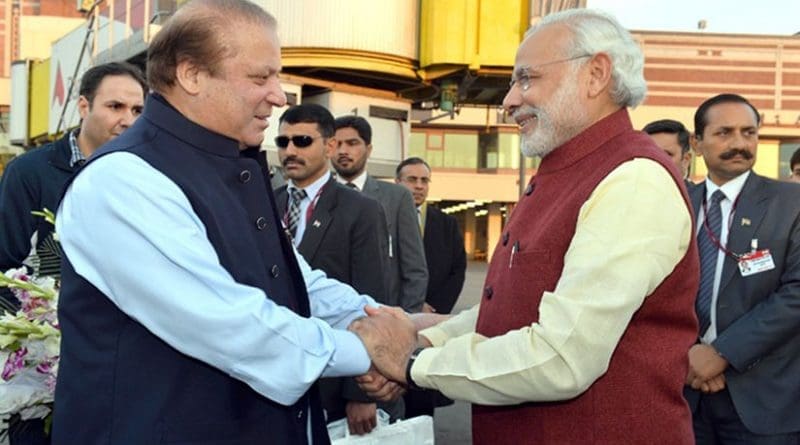Lie To Me? Intelligence Sharing By Pakistan Should Not Generate Unchecked Optimism – OpEd
By Mahendra Ved*
Diplomatic niceties may not permit it, but security concerns and the past records compel one to take with the proverbial pinch of salt Pakistan’s recent sharing of intelligence with India, tipping the latter off about the entry of terrorists to carry out attacks.
Lashkar-e-Taiba (LeT) that is banned in Pakistan was specifically mentioned and so was the likely timing, the Mahashivratri festival. The likely entry point was Gujarat, which caused India to sound an alert in the state, with special focus on the historic Somnath temple on the Saurashtra coast.
The unstated, but obvious part of the warning to India was that the terrorists had left the Pakistani territory (there is no other plausible route) and were likely using the sea route the way those who conducted the terror attacks in Mumbai had done in 2008. Incidentally, LeT was responsible for those attacks. Seven years down, scenario is similar.
That the attack(s) did not take place must be is a matter of relief for the South Asian neighbours engaged in a complex, perennially hostile relationship. But there is nothing to suggest that they would not occur at a later date, days or weeks after the one indicated.
If such attack is to take place any time now, Pakistan would be eminently placed in a position to say “we told you saw.” The onus would be totally on India for failing to prevent it, despite this rare, if not unprecedented, warning coming from the most unlikely source.
This would seem cynical in the context of slow, halting, even reverse process of trial of those responsible the Mumbai attacks. While Zaki-ur-Rahman Lakhvi who India says carried out the attacks, has been in and bailed out of jail, his mentor and the mastermind, Hafeez Saeed is at large, continuing to spout venom at India.
The onus to gather and provide evidence has been put on India and Pakistan keeps rejecting whatever sent as ‘heresay’ or “non-actionable”. It can be said that as if in retaliation, India has also been slow in probing the Samjhauta Express deaths, mostly of Pakistani nationals.
Having pointed these out, it needs stressing that any intelligence sharing, any cooperation in any arena must be welcomed for the larger bilateral ties and for the good of the people.
Also, whether viewed bilaterally or from the prism of the world community, another terror attack, while the previous ones remain unresolved and adversely impact the ties, would push the fragile relations several steps backward, for a long period, with the inherent risk of border clashes. Given its current strident domestic discourse, the Government of India, for one, would be under greater pressure to act.
A comparison between how Pakistan responded to the Mumbai terror attacks to the one on Pathankot base of the Indian Air Force has already been made. Unlike in 2008, Pakistan acknowledged that the Pathankot attack had emanated from its territory took care to condemn it and offered to investigate and enter into a joint probe.
Pointing out that the 2008 events had ‘poisoned’ India-Pakistan relation for long and had ‘jeopardized’ Pakistan’s standing among the world community, Dawn newspaper rightly says in is editorial (March 10, 2016): “Timely sharing of intelligence with India, investigating and prosecuting any Pakistani militants involved in staging the Pathankot attack, and resuming and rapidly concluding the Mumbai-related trials would send a powerful message on the anti-terror front.”
Pakistan changed its narrative to the world some years back from denying its role in fomenting and exporting terrorism to projecting itself as being its victim. This has been taken further to fighting it – selectively though. The two Sharifs – Prime Minister Nawaz and Army Chief General Raheel – are on the same page and the political class, leaving out the Islamists, has also willy-nilly fallen in line. Terror attacks like the one in December 2014 on Peshawar’s Army Public School that killed 140, mostly students, has created revulsion and firmed up their resolve.
Sections of Pakistani media have projected Nawaz’s recent moves as being part of a sort of ‘perestroika’ by the two Sharifs. The National Assembly has passed the first-ever legislation for the religious minorities. Annoying the conservative classes, Nawaz welcomed an Oscar-winning film on “honour killings”, passed a law for ‘protection’ of women and has secured acceptance of an invitation to visit Pakistan by the Pope.
While this whiff of change is being perceived at home and among Pakistan’s benefactors, India cannot lose sight of the fact that the fight against terrorism remains selective. The Zarb-e-Azb operation of the Pakistan Army is aimed at militants in the tribal areas, but the ‘core’ of militancy in Punjab, from where militants are dispatched to India, has remained largely untouched. Only now, over three months after the Pathankot attack, cases have been filed against militants from Gujranwala.
Only time will tell if these cases against Gujranwala militants are diligently pursued or will go the way of Mumbai masterminds, given the slow judicial processes and the high measure of support and sympathy for the accused.
Islamabad is keen to reopen bilateral talks, come what may, to score a diplomatic point or two. The intelligence sharing on likely terror attacks may be no more than a ploy to get New Delhi around in time for Nawaz meeting Prime Minister Narendra Modi in the United States, where both are attending the nuclear summit later this month.
*Mahendra Ved is an eminent journalist writing on issues concerning South Asia. He can be reached at: [email protected]

